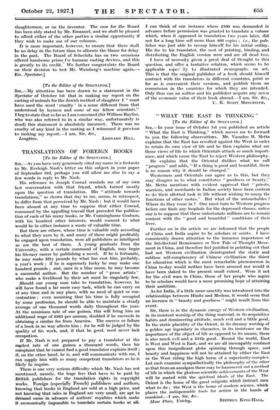TRANSLATIONS OF FOREIGN BOOKS
[To the Editor of the SPECTATOR.] SIII,—As you have very generously cited my name iria footnote to Mr. Eveleigh Nash's letter on this subject in your paper of September 3rd, perhaps you will allow me also to say a few words in reply to Mr. Nash.
His reference to Joseph Conrad reminds me of my own last conversation with that friend, which turned mostly Upon' the question of translation. His "attitude towards translations," as shown that day to me, seems, in retrospect, to differ from that perceived by Mr. Nash ; but it would have been absurd at any time to suppose that either Conrad, consumed by the appalling travail that preceded the publica- tion of each of his many books, or Mr. Cunninghame Graham, with his ' hundred other interests, would consent to what would be in either instance a waste of valuable time.
But there are others, whose time is valuable only according to what they earn by it, and many of these might profitably be engaged upon translation, were all publishers as intelligent as are the best of them. A young graduate from the University, with a certain command of English, may begin his literary career by publishing a novel. If he is fortunate, he may make fifty pounds by what has cost him, probably, a year's work ; if he is supremely lucky he may make one hundred pounds ; and, once in a blue moon, -he may become a successful author. But the number of "prose artists" who make a livelihood by their art must be singularly few.
,Should our young man take to translation, however, he will have found a far more easy task, which he can carry on at any time and in any place, with no need of 'quiet Or con- centration ; even assuming that his time is fully occupied by some profession, he should be able to maintain a steady average of one thousand words daily throughout the year. At the mininium rate of one guinea, this wilt bring him an additional wage of 2383 per annum, doubled if he succeeds in obtaining a similar fee from America. The success or failure of a book in no way affects him ; for he will be judged by the quality of his work, and, if that be good, need never lack
occupation. . - , •
If Mr. Nash is not prepared to pay a translator at the romdest rate of one guinea a thousand words, then his complaint that he cannot find a good translator explains itself ; if, on the other hand, he is, and will communicate with me, I can supply him with hs many competent translators as he is hikélj to*reqUire.
.There is one very serious difficulty which Mr. Nash has not mentioned, namely, the huge fees that have to be paid by British publishers for the translation rights in copyright works. Foreign (especially French) publishers and authors, knowing that books in England are sold at a high price, and not knowing that sales in England are very small, are apt to demand -sums -in advance of authors' royalties which make it economically impossible to translate certain books at all. I can think of one instance where 2100 was demanded in advance before permission was granted to translate a volume which, when it appeared in translation two years later, did not for a long time sell more than 400 copies ; i.e., the pub- lisher was just able to recoup himself for his initial outlay. His fee to his translator, the cost of printing, binding, and distributing the English version were and arc all dead loss.
I have of necessity given a great deal of thought to this question, and offer a tentative solution, which seems to be applicable especr-ily to illustrated monographs on art. This is that the original publisher of a book should himself contract with the translators in different countries, print se far as is convenient their versions, and publish them on commission in the countries for which they are intended. Only thus can an author and his publisher acquire any sense of the economic value of their book abroad.—I am, Sir, &c.,
C. K. SCOTT MONCRIEFF.


























































 Previous page
Previous page